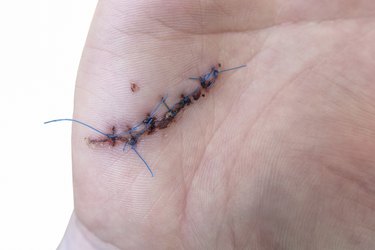
Got a nasty cut that required stitches? Certain nutrients can play a key role in healing it up quickly and prevent a scar from forming. But other foods, particular sugary foods, may slow the healing process. Seal the deal: Here's a breakdown of foods for wound healing after surgery or a cut.
Video of the Day
Video of the Day
Protein Sources
Protein is found all throughout your body and is necessary to build and repair muscle, as well as to prevent infections. This makes protein important for wound healing, according to Michigan Medicine.
High amounts of protein are found in lean meat, poultry and fish. A serving size is about 3 ounces or the size of a deck of cards. Michigan Medicine lists some of the highest protein sources (grams per 3 ounces) as:
- 90% lean ground beef: 22 g.
- Wild salmon and canned tuna: 23 g.
- Roasted turkey breast: 26 g.
- Tofu (4 ounces): 22 g.
Harvard T.H. Chan School of Public Health also recommends getting protein from plant-based sources. Options include:
- Legumes (beans and peas).
- Nuts.
- Seeds.
- Whole grains.
Found in many protein food sources is a mineral called zinc. "Protein and zinc are important for wound healing," says Jean LaMantia, RD, a Toronto-based dietitian and author of The Essential Cancer Treatment Nutrition Guide & Cookbook and The Complete Lymphedema Management and Nutrition Guide. "Zinc is found in a wide variety of foods and is highest in oysters, but [is] also in red meat, poultry, beans and nuts."
Harvard T.H. Chan School of Public Health states that zinc is a major player in the growth of cells, especially collagen and fiber-like tissues, which heal damaged cells. In addition, zinc supports your immune system, which helps combat inflammation from wounds.
Fruits and Vegetables
The Academy of Nutrition and Dietetics recommends choosing vegetables and fruits that are rich in vitamin C to help your wound recover. Similar to zinc, vitamin C plays a role in boosting collagen production and limiting inflammation, according to a December 2013 review published in the British Journal of Community Nursing.
The Office of Dietary Supplements lists foods rich in vitamin C as:
- Red pepper (1/2 cup): 95 mg.
- Orange (1 medium): 70 mg.
- Kiwi (1 medium): 64 mg.
- Broccoli (1/2 cup, cooked): 51 mg.
- Strawberries (1/2 cup): 49 mg.
- Brussels sprouts (1/2 cup, cooked): 48 mg.
And, according to a March 2019 review published in the International Journal of Molecular Sciences, the recommendation is to consume 500 milligrams of vitamin C per day in non-complicated wounds and up to 2 grams per day for more severe wounds. The same review also states that vitamin C is most beneficial for wound healing when it's paired with zinc and arginine for pressure ulcer wounds. According to the Mayo Clinic, arginine is an amino acid that our bodies make, but is also found in most protein-rich foods.
"It's easy to get enough vitamin C from your diet," LaMantia says. "Good sources include bell peppers and citrus fruits."
High Blood Sugar
"Having good blood sugar control is very important for wound healing," LaMantia says. "This is especially important if you have diabetes, pre-diabetes or insulin resistance."
The U.S. National Library of Medicine defines blood sugar, or glucose, as the main sugar that is found in your blood. Your blood sugar rises depending on the food you eat, and it is your body's main source of energy. The blood carries the sugars to cells to be used as fuel. High blood sugar can result in diabetes, but people can have high blood sugar from time to time without having diabetes.
An October 2013 study published in the journal Plastic and Reconstructive Surgery found that individuals with poor glycemic control had worse outcomes with wound healing, including the wound opening back up or the need for reoperation.
"To avoid high blood sugars, avoid concentrated sources of sugar like soda, sweets and refined baked goods," LaMantia says.
Read more: The Safest Ways to Exercise With a Suture Wound
- Michigan Medicine: “High-Protein Foods for Wound Healing
- Harvard T.H. Chan School of Public Health: “Protein”
- Jean LaMantia, RD, dietitian, Toronto, Ontario; author of The Essential Cancer Treatment Nutrition Guide & Cookbook and The Complete Lymphedema Management and Nutrition Guide
- Harvard T.H. Chan School of Public Health: “Zinc”
- Academy of Nutrition and Dietetics: “Five Nutrition Tips to Promote Wound Healing”
- British Journal of Community Nursing: “Vitamin C: A Wound Healing Perspective”
- Office of Dietary Supplements: “Vitamin C”
- International Journal of Molecular Sciences: “Nutrition and Wound Healing: An Overview Focusing on the Beneficial Effects of Curcumin”
- Mayo Clinic: “L-Arginine”
- U.S. National Library of Medicine: “Blood Sugar”
- Plastic and Reconstructive Surgery: “The Role of Chronic and Perioperative Glucose Management in High-Risk Surgical Closures”